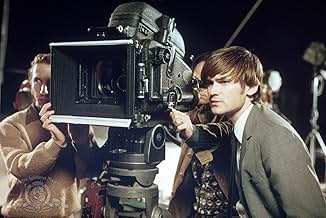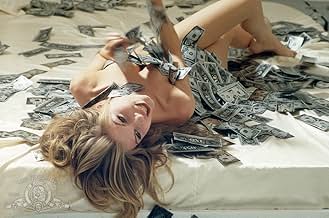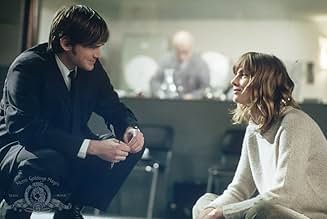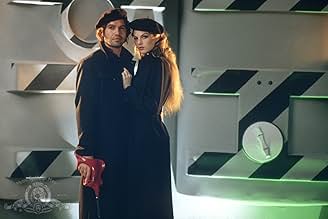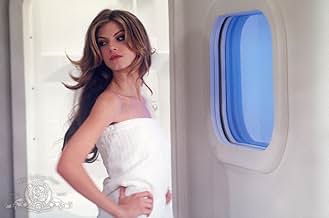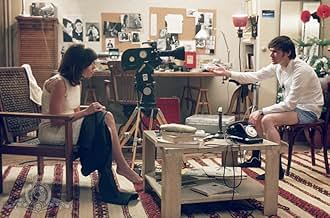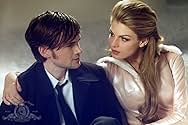VALUTAZIONE IMDb
6,2/10
5172
LA TUA VALUTAZIONE
Aggiungi una trama nella tua linguaA young filmmaker in 1960s Paris juggles directing a cheesy sci-fi debacle, directing his own personal art film, coping with his crumbling relationship with his girlfriend, and realizing tha... Leggi tuttoA young filmmaker in 1960s Paris juggles directing a cheesy sci-fi debacle, directing his own personal art film, coping with his crumbling relationship with his girlfriend, and realizing that he's infatuated with the sci-fi film's starlet.A young filmmaker in 1960s Paris juggles directing a cheesy sci-fi debacle, directing his own personal art film, coping with his crumbling relationship with his girlfriend, and realizing that he's infatuated with the sci-fi film's starlet.
- Regia
- Sceneggiatura
- Star
- Premi
- 1 candidatura in totale
Recensioni in evidenza
(Note: Over 500 of my movie reviews are now available in my book "Cut to the Chaise Lounge or I Can't Believe I Swallowed the Remote!" Get it at Amazon.)
There are two films within a film in this campy debut from Roman Coppola. There is the introspective black and white, experimental, "student" sort of film that the young director Paul (Jeremy Davies) is making in his Paris apartment, and there is "Dragonfly," a kind of Barbarella (1968) sci-fi space shoot 'em up that he ends up directing. These might be seen as the twin realities of the young film maker: on the one hand there are those short films you made at USC or UCLA film school to get your degree; on the other, there are those mindless commercial entertainments that Hollywood needs to crank out for the masses. These represent the bookends of the young director's reality.
The third film, the film that exists over and above these two, is the film that Roman/Paul would like to make, a film about what it is like to be a young film maker amid the crass commercialism of the producers, the seductive lure of the glamor that is the film maker's world, and the daily often tedious work of the actual film making. In other words, Roman Coppola is self-exploring in public. He is the novelist as a film maker.
"Dragonfly" itself is indeed Barbarella without the benefit of Terry Southern's contributions to the script or the services of Jane Fonda. It is unconsciously campy and a satire on such films. Model Angela Lindvall, five feet ten and three-quarters inches tall, anorexically thin, and sporting some very serious hair, plays Dragonfly with a kind of Barbie doll intensity. It is immediately obvious that she has the muscle tone of the languid and the athletic ability of a preteen. Yet her character is a "for hire" secret agent skilled in the martial arts and the use of weapons. Playing opposite her is Billy Zane as "Mr. E" a kind of Che Guevara revolutionary who is absurdly stationed on the far side of the moon where he is training revolutionaries.
In the introspective black and white film, Paul sits on the commode and talks to the camera much to the disdain of his live-in girlfriend Marlene (French actress Elodie Bouchez, best known for her work in the outstanding The Dreamlife of Angels (1998)) who would like him to pay more attention to her.
This might be compared (distantly) with Francois Truffaut's La Nuit Américaine (Day for Night) from 1973 in which the great French director plays himself making a film--in other words a film within a film. Jeremy Davies reminds me somewhat of the sensitive, boyish actor Jean-Pierre Leaud, who played in that film after gaining prominence in Truffaut's Les Quatre cents coup (1959). It is easy to see Truffaut's influence on Roman Coppola, as indeed Truffaut has influenced many directors.
I don't think CQ ("Seek You") was entirely successful mainly because I don't think Roman made the transition from the self-indulgence and showiness characteristic of the very films he is satirizing to the mature project that addresses itself more directly to the needs of the audience. There is some fancy camera work with mirrors and characters seen from interesting angles, and some beautifully constructed sets, and some witty dialogue amid some telling satire of filmland people and their world (especially producer Enzo played by Giancarlo Giannini and Dragonfly's idiot second director), but we are never made to care about what happens to any of the characters, this despite the fact that Davies is a very sympathetic actor.
Some of the jokes in the film include the three-day five o'clock shadows on the faces of the young actors. (That style is almost contemporary--not sixties-ish.) The hairstyles of the women with the beehives and such hinted of 1969, the year of the main film, but the eye makeup again was more contemporary than sixties-ish since it lacked the very heavy black eyelashes and eye liner that one recalls. To get it right, Roman should have reviewed, e.g., Blow-Up (1966) or Elvira Madigan (1967), films I am sure he has seen. Another is the view of Paris in the year 2001 as seen from 1970. It is futuristic in a silly way, and recalls some science fiction that exaggerated the technological changes that would take place. Orwell's 1984 (from 1948) has not yet arrived, nor has the overpopulated, polluted world from Blade Runner (1982).
Appearing in small roles are Dean Stockwell as Paul's father, and veteran French film star Gerard Depardieu as Dragonfly's original director.
Bottom line: worth seeing if only because it is the first film of the son of Francis Ford Coppola who may yet do something to rival the great works of his father. By the way, this might also be compared to The Virgin Suicides (2000), his sister Sofia Coppola's first film, just to see who is more likely to best please Dad. I'm taking no bets.
There are two films within a film in this campy debut from Roman Coppola. There is the introspective black and white, experimental, "student" sort of film that the young director Paul (Jeremy Davies) is making in his Paris apartment, and there is "Dragonfly," a kind of Barbarella (1968) sci-fi space shoot 'em up that he ends up directing. These might be seen as the twin realities of the young film maker: on the one hand there are those short films you made at USC or UCLA film school to get your degree; on the other, there are those mindless commercial entertainments that Hollywood needs to crank out for the masses. These represent the bookends of the young director's reality.
The third film, the film that exists over and above these two, is the film that Roman/Paul would like to make, a film about what it is like to be a young film maker amid the crass commercialism of the producers, the seductive lure of the glamor that is the film maker's world, and the daily often tedious work of the actual film making. In other words, Roman Coppola is self-exploring in public. He is the novelist as a film maker.
"Dragonfly" itself is indeed Barbarella without the benefit of Terry Southern's contributions to the script or the services of Jane Fonda. It is unconsciously campy and a satire on such films. Model Angela Lindvall, five feet ten and three-quarters inches tall, anorexically thin, and sporting some very serious hair, plays Dragonfly with a kind of Barbie doll intensity. It is immediately obvious that she has the muscle tone of the languid and the athletic ability of a preteen. Yet her character is a "for hire" secret agent skilled in the martial arts and the use of weapons. Playing opposite her is Billy Zane as "Mr. E" a kind of Che Guevara revolutionary who is absurdly stationed on the far side of the moon where he is training revolutionaries.
In the introspective black and white film, Paul sits on the commode and talks to the camera much to the disdain of his live-in girlfriend Marlene (French actress Elodie Bouchez, best known for her work in the outstanding The Dreamlife of Angels (1998)) who would like him to pay more attention to her.
This might be compared (distantly) with Francois Truffaut's La Nuit Américaine (Day for Night) from 1973 in which the great French director plays himself making a film--in other words a film within a film. Jeremy Davies reminds me somewhat of the sensitive, boyish actor Jean-Pierre Leaud, who played in that film after gaining prominence in Truffaut's Les Quatre cents coup (1959). It is easy to see Truffaut's influence on Roman Coppola, as indeed Truffaut has influenced many directors.
I don't think CQ ("Seek You") was entirely successful mainly because I don't think Roman made the transition from the self-indulgence and showiness characteristic of the very films he is satirizing to the mature project that addresses itself more directly to the needs of the audience. There is some fancy camera work with mirrors and characters seen from interesting angles, and some beautifully constructed sets, and some witty dialogue amid some telling satire of filmland people and their world (especially producer Enzo played by Giancarlo Giannini and Dragonfly's idiot second director), but we are never made to care about what happens to any of the characters, this despite the fact that Davies is a very sympathetic actor.
Some of the jokes in the film include the three-day five o'clock shadows on the faces of the young actors. (That style is almost contemporary--not sixties-ish.) The hairstyles of the women with the beehives and such hinted of 1969, the year of the main film, but the eye makeup again was more contemporary than sixties-ish since it lacked the very heavy black eyelashes and eye liner that one recalls. To get it right, Roman should have reviewed, e.g., Blow-Up (1966) or Elvira Madigan (1967), films I am sure he has seen. Another is the view of Paris in the year 2001 as seen from 1970. It is futuristic in a silly way, and recalls some science fiction that exaggerated the technological changes that would take place. Orwell's 1984 (from 1948) has not yet arrived, nor has the overpopulated, polluted world from Blade Runner (1982).
Appearing in small roles are Dean Stockwell as Paul's father, and veteran French film star Gerard Depardieu as Dragonfly's original director.
Bottom line: worth seeing if only because it is the first film of the son of Francis Ford Coppola who may yet do something to rival the great works of his father. By the way, this might also be compared to The Virgin Suicides (2000), his sister Sofia Coppola's first film, just to see who is more likely to best please Dad. I'm taking no bets.
I admit I was just going to see this film for the close-ups of my favorite actor Billy Zane because its been far too long since I've seen his face on the big screen. However, the film was actually well done and had an interesting 60's tone which is pulled off very well. But the one thing that bothered me was why the title "CQ" ? It had one brief reference to CQ > seeks you but not enough to name a whole movie after it. Anyway, Billy did a good job and was very entertaining so for all you Billy fans, go see CQ if you can find it playing near you.
8dtb
Paul Ballard (Jeremy Davies), a young film editor living in Paris in 1969, gets his big directorial break when DRAGONFLY, the sexy futuristic (it's set in 2001!) spy flick he's editing, loses not one but two directors. It should be noted that Paul's been filching black-and-white film from the DRAGONFLY production company to make his own rather self-indulgent cinema verite film at home. Once he's at the helm of the big-budget SF schlockfest, Paul has a hard time distinguishing between real life and reel life as he falls in love with the bewitching Valentine (Angela Lindvall), an activist-turned-actress making her film debut as "Agent Code Name: Dragonfly." Think of this comedy-drama as a sort of 8½ or DAY FOR NIGHT for the baby boomer generation. It's clear that writer/director Coppola (Francis Ford Coppola's son, big shock :-) has great affection for the art of filmmaking in general and for kooky, cheesy 1960s Eurocinema romps such as BARBARELLA and DANGER: DIABOLIK in particular (neat in-joke: the leading man of those films, John Philip Law, appears in CQ as Dragonfly's spymaster). The score by the appropriately-named Mellow captures the mod mood music of the era delightfully. At times Paul's self-absorption became as grating to me as it did to his long-suffering girlfriend Marlene (Elodie Bouchez), but the spoofery of filmmaking and the 1960s won me over. The excellent cast helps a lot, particularly Dean Stockwell's touching turn as Paul's father, the ever-smooth Billy Zane as Dragonfly's revolutionary adversary/lover "Mr. E," and the hilarious performances of Giancarlo Giannini as a Dino deLaurentiis/Carlo Ponti-esque producer and Jason Schwartzman as the wild 'n' crazy replacement director who gets replaced himself after he breaks his leg in a sports car accident. Don't blink or you'll miss Roman and Jason's Oscar-winning kin Sofia Coppola cameoing as Giannini's mistress. I was also utterly charmed by model Angela Lindvall in her movie debut (art imitating life -- ain't it grand? :-). It's great fun to watch Lindvall switch from throaty-voiced siren Dragonfly onscreen to sweet, endearing animal lover Valentine offscreen, plus she's got the most expressive eyebrows since Eunice Gayson in DR. NO and FROM RUSSIA WITH LOVE. (My hubby would like me to point out that Leonard Nimoy and The Rock are tops in Expressive Eyebrows, Male Division! :-) Do rent the DVD version of CQ so you can also watch the entire film-within-the-film DRAGONFLY, which is to the CQ DVD what MANT! is to the MATINEE laserdisc (is MANT! on the MATINEE DVD, too? If not, it oughta be!) -- with enjoyable commentary by Lindvall, yet!
Watching the trailer for this movie, I couldn't help but feel excited.
Look at all the swank 60's spy movie references!
Well ... this wasn't the movie I'd hoped for. I believe that "CQ" is Roman Coppola's (son of famous Francis Ford Coppola) first feature-length movie. And I suppose that all first-time directors flail and hick-up in their first (hell, even second and third) films.
But Coppola very blatantly tries to conceal all his director and writer disabilities by shrouding the film with 60's pop-culture trivia ... something that I'm sure his "hipster" handbook directed him to do.
The premise involves an American attempting to edit a ridiculously avant-gard sci-fi/spy Modesty Blaise-esque movie in Paris ... while in his personal time he whines and moans about how he isn't adept enough to sustain a meaningful relationship ... all this through the eyes of a camera. And whilst he records his day-to-day life on film ... he neglects his stunning french girlfriend.
So ... our young American in Paris ends up taking the reigns of the spy movie and plenty of hijinx ensue.
It isn't hard to predict how the movie will end. And if you wait around long enough and can somehow see past Coppola's bloated, pretentious and pedestrian writing and direction ... then you'll have earned a shining ticket to complain about how great this movie COULD have been.
And people wonder why nobody remembers (or wants to remember) this movie. Chalk it all up to the futile attempts of a son of a great director to become more than his father.
Remember ... even old Francis Ford had to LEARN filmmaking. Anyone ever see "Dementia 13?" It wasn't a HORRIBLE movie ... but then again ... it wasn't "Apocalypse Now," either.
Roman's sister, Sophia Coppola has done so interesting work. If anyone inherited Francis Ford's filmmaking genes ... my guess is that it's her. "The Virgin Suicides" is a really excellent movie. "Lost in Translation" wasn't bad either.
So ... Roman ... keep on making those music videos. Your video for "The Strokes" was painfully dull ... but it was a little easier for me to switch channels.
Look at all the swank 60's spy movie references!
Well ... this wasn't the movie I'd hoped for. I believe that "CQ" is Roman Coppola's (son of famous Francis Ford Coppola) first feature-length movie. And I suppose that all first-time directors flail and hick-up in their first (hell, even second and third) films.
But Coppola very blatantly tries to conceal all his director and writer disabilities by shrouding the film with 60's pop-culture trivia ... something that I'm sure his "hipster" handbook directed him to do.
The premise involves an American attempting to edit a ridiculously avant-gard sci-fi/spy Modesty Blaise-esque movie in Paris ... while in his personal time he whines and moans about how he isn't adept enough to sustain a meaningful relationship ... all this through the eyes of a camera. And whilst he records his day-to-day life on film ... he neglects his stunning french girlfriend.
So ... our young American in Paris ends up taking the reigns of the spy movie and plenty of hijinx ensue.
It isn't hard to predict how the movie will end. And if you wait around long enough and can somehow see past Coppola's bloated, pretentious and pedestrian writing and direction ... then you'll have earned a shining ticket to complain about how great this movie COULD have been.
And people wonder why nobody remembers (or wants to remember) this movie. Chalk it all up to the futile attempts of a son of a great director to become more than his father.
Remember ... even old Francis Ford had to LEARN filmmaking. Anyone ever see "Dementia 13?" It wasn't a HORRIBLE movie ... but then again ... it wasn't "Apocalypse Now," either.
Roman's sister, Sophia Coppola has done so interesting work. If anyone inherited Francis Ford's filmmaking genes ... my guess is that it's her. "The Virgin Suicides" is a really excellent movie. "Lost in Translation" wasn't bad either.
So ... Roman ... keep on making those music videos. Your video for "The Strokes" was painfully dull ... but it was a little easier for me to switch channels.
This film is entertaining, thoughtful and beautifully photographed, It cleverly mixes documentary with the real lives of it's characters giving a new twist to the "story within a story" genre. Every actor gives an honest performance in a story that could have easily slipped into the same old tortured artist crap that seems so popular in film today. The soundtrack is very much a part of the story in that it represents the era in which the film is set and the style in which the film within the film is set. Roman Coppola may be Francis' son but he is not a copycat.
Lo sapevi?
- QuizAfter being fired, Andrezej puts his fist through the screening room door. This is a reference to Francis Ford Coppola (father of director Roman Coppola) and his short temper. When the editors get a framed section of the destroyed wall, it is actually a portion of a wall the elder Coppola wrecked in his early directing days.
- BlooperIn the tunnel, when Dragonfly swerves in reverse, there already are skid marks on the ground along the path taken by the car's tires.
- ConnessioniFeatured in On the Set of 'CQ' (2002)
- Colonne sonoreCe Soir, Je Vais Boire
Lyrics by Gilles Thibaut
Music by Bruno Canfora
Performed by Claude François
Courtesy of Universal International Music, B.V.
Under license from Universal Music Enterprises
I più visti
Accedi per valutare e creare un elenco di titoli salvati per ottenere consigli personalizzati
- How long is CQ?Powered by Alexa
Dettagli
- Data di uscita
- Paesi di origine
- Sito ufficiale
- Lingue
- Celebre anche come
- Агент «Стрекоза»
- Luoghi delle riprese
- Aziende produttrici
- Vedi altri crediti dell’azienda su IMDbPro
Botteghino
- Budget
- 7.000.000 USD (previsto)
- Lordo Stati Uniti e Canada
- 414.358 USD
- Fine settimana di apertura Stati Uniti e Canada
- 54.942 USD
- 27 mag 2002
- Lordo in tutto il mondo
- 499.891 USD
- Tempo di esecuzione1 ora 28 minuti
- Colore
- Mix di suoni
- Proporzioni
- 1.85 : 1
Contribuisci a questa pagina
Suggerisci una modifica o aggiungi i contenuti mancanti



